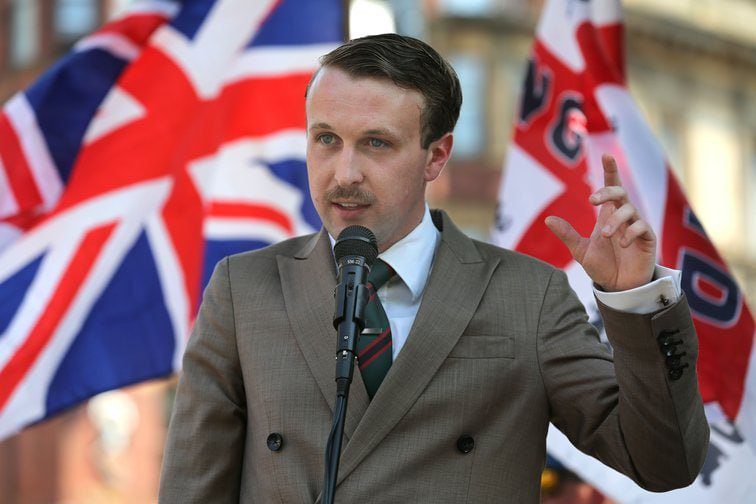


By Paul Gale
As the dust settles on an election campaign which for them was universally catastrophic, the UK’s extreme right is licking its wounds and eyeing up potential targets for blame.
The main factor behind their dire performance, of course, was the involvement of Reform UK especially after Farage announced his candidacy in Clacton in mid-campaign. Reform, itself stuffed with racists and extremists, will be the main force on the far right for the foreseeable future, but its success in hoovering up right wing votes which might otherwise have gone elsewhere, is leading to a period of instability and feuding amongst other groups further to the right.
UKIP, which fielded 24 candidates of its own and a couple under the banner of Patriots Alliance, its electoral coalition with the English Democrats, is watching its membership shrivel by the day. This trend is not new but was seriously exacerbated by the total fiasco of Lois Perry’s election as leader in May to be followed in short order by her endorsing Farage and Reform in the general election and then quitting, citing health reasons.
Her departure, throwing the UKIP campaign into chaos, was the subject of dark mutterings about a Farage-inspired plot to bring UKIP down (a suggestion, we hasten to add, for which no evidence has been offered).
She was replaced by her deputy Nick Tenconi, a spiteful specimen drafted in from Turning Point UK. But now members are asking how they found themselves with two leaders in quick succession who had each only been a member of the party for a few weeks before taking it over.
Perry did at least have some claim to the post having, on the face of it, won a leadership election. But even this is being looked at with increasing scepticism. Her election rival, UKIP veteran and ex-MEP Bill Etheridge, resigned during the general election campaign pouring doubt and scorn on the integrity of the party’s internal election process. He was followed by NEC member and Defence & Veterans spokesman, Ret’d Squadron Leader Peter Richardson.
None of this was helped by former Deputy Leader Rebecca Jane’s incendiary open letter to members, published in Searchlight. It prompted a wave of resignations from a rapidly depleting membership.
Their general election performance was a total fiasco, with only two of their candidates getting more than 1%. One was the the odious, smirking bigot from south Wales, Stan Robinson who polled 1.47%. The other was NEC member and National Campaign Manager, Janice MacKay, who in very odd circumstances was parachuted into the Great Wyrley and Penkridge constituency in Staffordshire, which lies some 270 miles from her Scottish address and where the Reform UK candidate withdrew his candidacy only minutes before nominations closed. This happy sequence of events meant that she was in the fortunate position of not having a Reform opponent and so managed to harvest the (still not very) handsome total of 6.17% of the vote. She, alone of UKIP candidates, saved her deposit though the other forfeits will not impact on the party’s finances – candidates had to find the £500 out of their own pockets anyway. And, three days after the election, the UKIP website has still not been updated to include its election results.
Another question that the NEC will now have to answer – if they can – is how UKIP came, via a three-party alliance, to be involved with the openly neo-Nazi Patriotic Alternative who, like UKIP, forged an electoral alliance with the English Democrats. Members of a more conservative than fascist hue, who were taken aback at the NEC’s decision to admit former members of neo-Nazi groups as UKIP members, believe their worst fears have been realised and are very unhappy.
And there remain the unresolved questions about the mysterious trust which now appears to completely own UKIP and which is in turn controlled by Chairman Ben Walker. As the party’s Returning Officer it is Walker who is also facing questions about the process through which Perry became leader.
For Patriotic Alternative the electoral alliance with the EDs was a thoroughly opportunist arrangement with a party with whom they have little in common. The principal motive for it was PA leader Mark Collett’s panic that if he didn’t have some presence in the election, it would redouble the accusations already flying around that he is more interested in online grifting than real politics. And, with a pile of cash raised on the back of Sam Melia’s imprisonment, he could hardly claim they couldn’t afford it. However, having failed to register as a political party his options were limited – till the EDs leader Robin Tilbrook came to his rescue.
But it has all backfired. The performance of the ED candidates, and especially the PA cuckoos in the nest, was derisory and, like UKIP, PA’s public face – its Telegram channel – is totally silent on its election performance; since the election it has posted only an item about its Summer camp, complete with a cosy picture (below) of Mark Collett with jailed ‘race martyr’ Sam Melia’s wife, Laura Towler.

Collett is now being targeted by National Rebirth Party leader Alek Yerbury as the main architect of failure. Yerbury argued for complete abstention from the election, saying that given their pathetic resources, it was simply a waste of time and effort at this stage.
There is a growing feeling on the right that he was correct, and the others got it wrong. Now, challenged to a debate on future strategy by Yerbury, Collett has had little choice but to agree, though he knows he is on a hiding to nothing. Yerbury is rubbing his hands in anticipation. He is targeting PA’s membership as vulnerable to a raid from a party which positions itself as more serious, with a clear sense of strategic direction. The debate will be held online in a few weeks’ time.
The British Democrats ran only four candidates, and their votes were pitiful though you wouldn’t know that from their website because, yes, you’ve guessed it, three days after the election they feature a long article listing how many leaflets they delivered and how many doors they knocked on, but not one word about how many votes they won.

Ssshhh…don’t mention the results
They, like Homeland Party who didn’t run in the election but told members to vote Reform, are likely to be targeted next by Yerbury who is already deriding the ‘ladder strategy’ which they have both adopted. This posits years of campaigning at, for instance, parish council level to establish credibility before seriously contesting national elections in a particular local area. According to Yerbury:
“There is a line of thinking that by doing thankless tasks for your local community, at a low level, it will set you up for success in elections.
“In theory, that sounds good, but in practice what will actually happen is that you will become a local dogsbody who is well liked, but also viewed as someone whose function is to clean up problems that other people make, and people will get resentful the moment you stop doing it in order to move on and do things like working in parliament etc.”
That argument is likely to resonate with young activists in Homeland and the BDs who want something a little more positive and exciting to do than collect litter and pick up dog poo in the local park.
It may not be long before the (long) knives are out…
Top pictures, left to right: UKIP’s musical chairs leadership, Lois Perry and Nick Tenconi; PA activist Craig Buckley stands as ED candidate in Leigh; NRP leader Alek Yerbury





